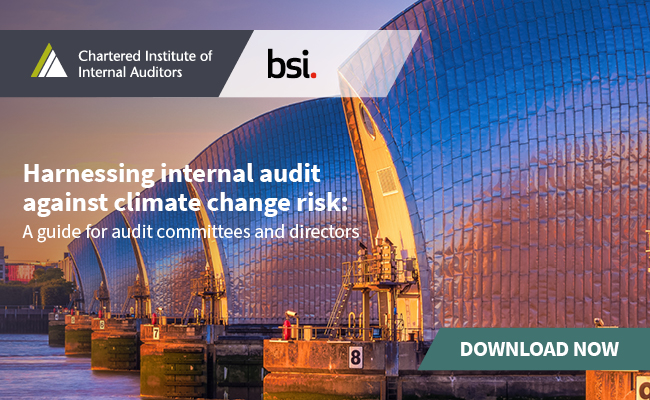Harnessing internal audit against climate change risk
A guide for audit committees and directors
Climate change is arguably the most acute challenge facing our planet right now and is an issue that is firmly moving up the agenda. It is one that organisations simply cannot afford to ignore or sideline any longer, for those that do not take action face the genuine risk of an existential crisis.
Internal audit has an important role to play in managing this challenge and its associated opportunities, along with a responsibility to add true value to the work of organisations on climate risk. Firstly, as a trusted advisor to the organisation in terms of how it is identifying, managing and mitigating the risks and opportunities associated with climate change. Secondly, to comment on and assess the measures that the organisation puts in place to reduce its environmental impact and contribution to climate change.
Given the level of risk, we need to see boards and audit committee chairs take full advantage of their internal audit functions. As this guide reveals, internal audit is one of the most powerful tools to guard against this ever-increasing risk.
Download the guide
About the guide
Our aim for this guide is twofold, and we take a two-pronged approach:
- Firstly, we want senior leaders to make demands of and fully harness their internal audit teams in respect of climate change preparedness. To start the conversations and begin the work.
- Secondly, we want to encourage internal audit professionals to be leaders in this space, stepping up to show their value and worth to the organisations they serve. Of those organisations who have not yet begun their journey towards fully auditing climate change risk, most already know that something must be done.
To produce the guide, we held meetings with professionals and experts who we felt could shed light on the topic of climate governance and partnered with the British Standards Institution (BSI).
We held two advisory panel sessions, speaking to Chief Audit Executives (CAEs), audit committee chairs, professionals and academics with a background in climate change risk and audit.
Related content
Organisations’ preparedness for climate change: an internal audit perspective
Climate change and environmental impact
Climate strategy
Auditing climate data and reporting
Carbon usage
Auditing working conditions - climate impact
Climate Financial risk auditing
Climate impact within supply chains










